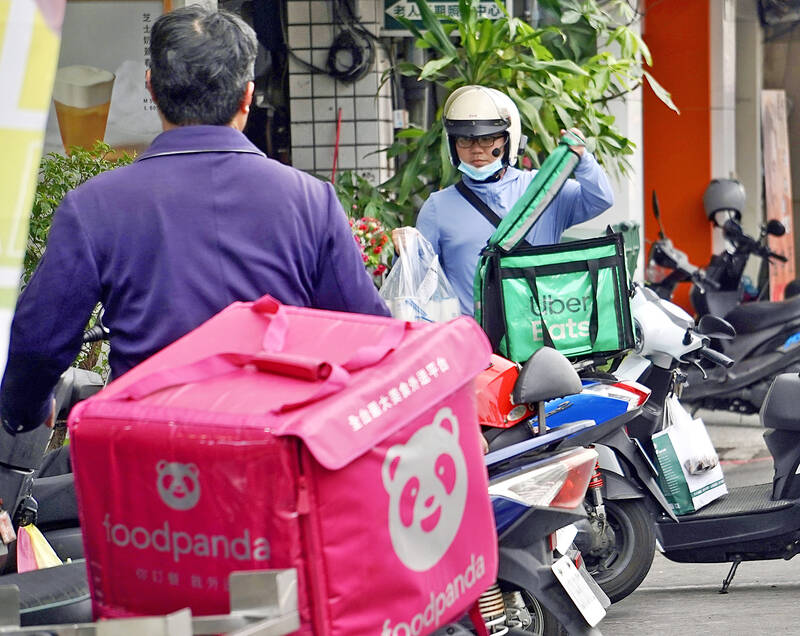Official standards for food delivery fees are to be set by the Ministry of Transportation and Communications, with implementation expected as early as next month.
The Legislative Yuan’s Transportation Committee in its last session amended the Transportation Management Regulations (汽車運輸業管理規則), requiring the ministry to set official standards for food delivery rates.
Food delivery companies currently set their own prices.

Photo: CNA
The new pricing scheme would reference rates used by the three transportation industries — automobile transportation, limited-route automobile transportation and container transportation — and take into account that scooters are the primary food delivery vehicle, the amendments say.
Companies could cite fuel, tires, vehicle depreciation, repairs, delivery personnel salaries, incurred costs of operation, maintenance crew salaries, maintenance costs, administrative fees, administrative personnel salaries, depreciation of equipment, management fees, salaries for managers and taxes as overhead costs, the amendments say.
The ministry would only be responsible for setting the standard equation and basic rates, while companies and unions should discuss and finalize the actual fares, they say.
Delivery fees should be calculated as an aggregate of multiple fees, including the base fare, a predefined distance and the lowest amount a consumer should pay after purchasing products and having them delivered, they say.
Base fares should be calculated in kilometers, they say.
Additional fees should be included for deliveries outside the defined distance of the base fare, the amendments say.
The changes would allow delivery workers to charge for wait times, regardless of whether they are waiting for a restaurant to pack a delivery or for the buyer to collect, they say.
Buyers would have to pay an additional set fee for each floor the deliverer has to go up to provide doorstep delivery, they say.
The driver would also be entitled to nighttime and Lunar New Year delivery surcharges, they say.
The National Delivery Industrial Union yesterday said that the amendments provide a legislative basis for food delivery rates and guarantee drivers’ rights.
The ministry demonstrated sincerity with the amendments, which resulted from repeated negotiations between the ministry, the union and business representatives, it said.
It would guarantee delivery workers’ incomes, and allow healthy and sustainable development of the delivery industry, it added.
Uber Eats said it would need to go over the amendments before it could comment.
Foodpanda had not responded to a request for comment as of press time last night.

Three batches of banana sauce imported from the Philippines were intercepted at the border after they were found to contain the banned industrial dye Orange G, the Food and Drug Administration (FDA) said yesterday. From today through Sept. 2 next year, all seasoning sauces from the Philippines are to be subject to the FDA’s strictest border inspection, meaning 100 percent testing for illegal dyes before entry is allowed, it said in a statement. Orange G is an industrial coloring agent that is not permitted for food use in Taiwan or internationally, said Cheng Wei-chih (鄭維智), head of the FDA’s Northern Center for

The Chinese military has built landing bridge ships designed to expand its amphibious options for a potential assault on Taiwan, but their combat effectiveness is limited due to their high vulnerability, a defense expert said in an analysis published on Monday. Shen Ming-shih (沈明室), a research fellow at the Institute for National Defense and Security Research, said that the deployment of such vessels as part of the Chinese People’s Liberation Army (PLA) Navy’s East Sea Fleet signals a strong focus on Taiwan. However, the ships are highly vulnerable to precision strikes, which means they could be destroyed before they achieve their intended

LOOKING NORTH: The base would enhance the military’s awareness of activities in the Bashi Channel, which China Coast Guard ships have been frequenting, an expert said The Philippine Navy on Thursday last week inaugurated a forward operating base in the country’s northern most province of Batanes, which at 185km from Taiwan would be strategically important in a military conflict in the Taiwan Strait. The Philippine Daily Inquirer quoted Northern Luzon Command Commander Lieutenant General Fernyl Buca as saying that the base in Mahatao would bolster the country’s northern defenses and response capabilities. The base is also a response to the “irregular presence this month of armed” of China Coast Guard vessels frequenting the Bashi Channel in the Luzon Strait just south of Taiwan, the paper reported, citing a

About 4.2 million tourist arrivals were recorded in the first half of this year, a 10 percent increase from the same period last year, the Tourism Administration said yesterday. The growth continues to be consistent, with the fourth quarter of this year expected to be the peak in Taiwan, the agency said, adding that it plans to promote Taiwan overseas via partnerships and major events. From January to June, 9.14 million international departures were recorded from Taiwan, an 11 percent increase from the same period last year, with 3.3 million headed for Japan, 1.52 million for China and 832,962 to South Korea,